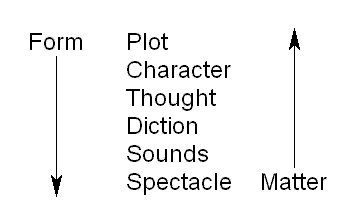
Smiley's Model (1971, p.11)
In Playwriting: The Structure of Action, Sam Smiley (1971) explores the process of playwriting,using Aristotle's model as a framework. In the first chapter, in arguing that fine arts are artificial (that is, manufactured) objects, he explores Aristotle's four causes for coming into being of an artificial product.
For those unfamiliar with Aristotle's causes, the material cause of an object is the substance of its construction. The material cause of a house is the wood and concrete used to construct it. The formal cause is the form of the object. For a house, this would correspond roughly to its blueprint design. The efficient cause is the process that constructs the object. This would be the construction workers who build the house. The final cause is the end to which the object is constructed. A house is usually constructed to provide shelter.
Smiley very briefly presents Aristotle's six parts of drama as connected by formal and material causes. (Although the four causes are an Aristotelian concept, Aristotle himself does not state such causes between the six parts in Poetics.) Smiley presents them in the same order as Aristotle--Plot, Character, Thought, Diction, Sounds, and Spectacle--and contends that each element dictates the form of those below, while each provides the material for the element above.
For Smiley, Plot is constructed in terms of the actions of the Characters. The material from which we build Character is Thought1. Thought is itself constructed from words, or Diction. Diction is made up of Sounds. (Note the change here from Aristotle's Song.) Spectacle--"the physical actions that accompany the words" (Smiley 1971, p.12)--is the most basic material of all.
A playwright holds the formal order to be most important. A certain Plot dictates the qualities required of the Characters. Based on these qualities, the characters will espouse certain Thoughts, expressed in certain Diction, and so on. In contrast to the playwright, the actors and production team tend to construct the play working in the material order, beginning with the Spectacle.
Note that Aristotle's distinction between object, medium, and manner has been ignored here. We will soon discover that a number of tensions were introduced by this omission, as these few paragraphs of Smiley's become the foundation of the modern poetics of interactive drama.
|
Argax Project : Dissertation :
A Rough Draft Node http://www2.hawaii.edu/~ztomasze/argax |

|
Last Edited: 08 Apr 2011 ©2006 by Z. Tomaszewski. |